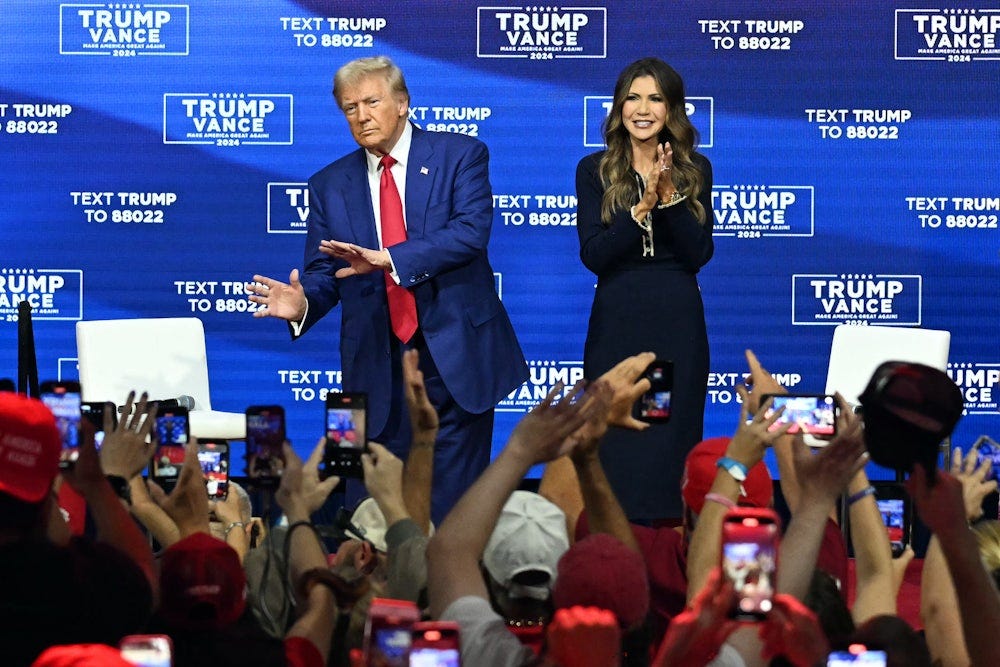The Washington Post Covered That Bizarro Trump Rally the Right Way
The Post’s reporter described Trump’s weird town hall–dance party exactly as it was. Is the press starting to get it?
Credit where credit’s due: The Washington Post got one very right.
Marianne LeVine’s recent article didn’t just report on Donald Trump’s latest campaign event—it unflinchingly showcased the sheer oddity of it. In a media environment in which Trump’s bizarre behavior often gets sanitized by political journalists, the Post delivered a straightforward account of an event that raises serious questions about Trump’s mental state.
At a town hall in Oaks, Pennsylvania, on Monday night, Trump was expected to engage with preselected attendees and answer their questions. Instead, after two individuals required medical attention, he took an unexpected turn. “Let’s not do any more questions. Let’s just listen to music. Let’s make it into a music. Who the hell wants to hear questions, right?” he said.
And just like that, a political town hall morphed into a 39-minute personal jam session. Trump played nine tracks from his self-curated playlist, swayed onstage, and even invited the crowd to join in. LeVine captured the surreal scene perfectly:
For 39 minutes, Trump swayed, bopped—sometimes stopping to speak—as he turned the event into almost a living-room listening session of his favorite songs from his self-curated rally playlist.
This wasn’t a charming detour or a moment of levity; it was a bewildering departure from the friendly campaign event (while it was billed as a town hall, the preselected questions and the fawning interviewer, South Dakota Governor Kristi Noem, made clear that he wasn’t there to be challenged). With the election just weeks away, one would expect a candidate to seize every opportunity to address voters’ concerns. Instead, Trump chose to play DJ, leaving many in the crowd puzzled. Some attendees began to leave, while others looked around, unsure of how to react.
LeVine didn’t mince words:
Trump’s decision to cut short the question-and-answer portion of the town hall and instead have the crowd stay to listen to his favorite songs was a somewhat bizarre move, given that the election was only 22 days away. Vice President Kamala Harris has called Trump, 78, unstable and questioned his mental acuity.
In contrast, other major outlets seemed hesitant to highlight the strangeness of the event. The Associated Press headlined its piece: “Trump’s Pennsylvania town hall turns into impromptu concert after medical incidents.” That framing makes it sound like a spontaneous but benign occurrence, glossing over the fact that a presidential candidate essentially abandoned a key campaign event.
The New York Times went even further in Trump’s direction, describing him as “a political candidate known for improvisational departures.” This almost sounds admiring, as if his actions were a testament to his unpredictability rather than a potential sign of instability.
But let’s call it what it is. A candidate for the highest office in the land diverted a town hall into a personal concert, complete with songs like “YMCA” and “Nothing Compares 2 U.” It’s unsettling.
LeVine’s article stands out because it doesn’t try to normalize this behavior. By providing context, direct quotes, and vivid descriptions, she allows readers to fully grasp the event’s peculiarity without resorting to sensationalism.
For instance, she notes:
As Trump stood onstage in his oversize suit and bright red tie, swaying back and forth, it was almost as if he were taking a trip back to decades past.
The article also highlights how this behavior feeds into existing concerns about Trump’s fitness for office. Vice President Kamala Harris has openly questioned his mental stability, and events like this only add fuel to that fire.
In times when honest reporting is essential, the Post stepped up. The paper didn’t shy away from painting the full picture, uncomfortable as it may be. It’s crucial for the media to present these events accurately, without sugarcoating or unnecessary spin. When the bizarre becomes commonplace, it does a disservice to the public to pretend otherwise.
So kudos to The Washington Post. As voters, we deserve to know when a candidate’s actions raise legitimate concerns about their capability to lead. Ignoring or downplaying such incidents doesn’t do anyone any favors. It’s time more outlets followed suit and prioritized honest reporting over cautious neutrality.





